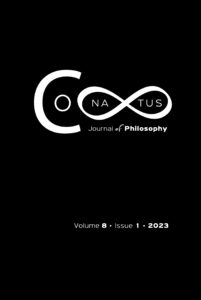
MPA Program Chair Uros Prokic Publishes in Conatus — Journal of Philosophy
2 min readYEREVAN, Armenia — The American University of Armenia (AUA) proudly announces the publication of an article authored by the Interim Chair of Master of Public Affairs program, Assistant Professor Uros Prokic. The article appeared in the recent issue of Conatus — Journal of Philosophy (Volume 8, Issue 1), an international, open-access, peer-reviewed academic periodical dedicated to the dissemination of original philosophical research. Conatus is published biannually by the Applied Philosophy Research Laboratory of the National and Kapodistrian University of Athens and is available both in print and online. In this article titled “Contemporary Epistemology of Nationalism: Faltering Foundationalism Contrasted with Holistic Coherentism,” Dr. Prokic examines the structure of knowledge of nationalism. While numerous studies on nationalism focus on the nature and defining elements of nations, this research provides a purely epistemological viewpoint. It addresses two overarching questions: What are the constitutive beliefs in these various theories, and how are they structured?
 The first section outlines a contemporary foundationalist argument and analyzes two widely accepted theories of nationalism from this theory of knowledge. The study identifies the linear constraints of the foundationalist approach that builds upon the existence of non-inferentially justified beliefs. Prokic concludes that such a model does not adequately capture the knowledge structures of nationalism, as no single element could serve as a self-justified foundational belief of nationalism.
The first section outlines a contemporary foundationalist argument and analyzes two widely accepted theories of nationalism from this theory of knowledge. The study identifies the linear constraints of the foundationalist approach that builds upon the existence of non-inferentially justified beliefs. Prokic concludes that such a model does not adequately capture the knowledge structures of nationalism, as no single element could serve as a self-justified foundational belief of nationalism.
The second part of this research utilizes contemporary coherence theory to assess the interconnected beliefs embedded in nationalism. Through the examination of several theories of nationalism that arguably adopt coherentism, this approach to philosophical understanding of knowledge provides for a holistic analysis.
The study concludes that the very definition of nationalism incorporates interconnected beliefs and ideas about ideology, ethnic foundation, shared cultural and historical facts, unity, and autonomy. This holistic perspective implies a befitting epistemological refocus away from foundationalism and towards coherentism.
Professor Prokic explains, “I am proud to have made a theoretical contribution to the vast body of knowledge on nationalism. This article takes a novel, overarching epistemic approach to nationalism discourse and assesses the fundamental ideas and beliefs embedded within it. Much literature has focused on what nationalism is and what it does, but rarely does it investigate how these ideas are structured. This article attempts to draw attention to this aspect of nationalism studies. I would like to thank my colleagues both at AUA and PSU for their professional support in this endeavor. I look forward to building on this philosophical study of nationalism as part of my ongoing research agenda at AUA. Investigating the structure of knowledge of nationalism from a variety of philosophical perspectives helps in furthering our understanding of this phenomenon.”
The Master of Public Affairs program gives students the analytical, policy, administrative, and leadership skills needed to make an impact on Armenian society and beyond. Public organizations need grounded leaders who recognize that policy challenges are fluid, interconnected, and global. Hence, MPA students are taught how to ask and answer relevant political questions, how to design policy solutions to public problems, and how to administer those solutions with skilled leadership and management appropriate to public, private, and nonprofit organizations. The program provides a substantive focus on development policy, strategy, and leadership – all essential to advancing the prosperity and stability of Armenia.
